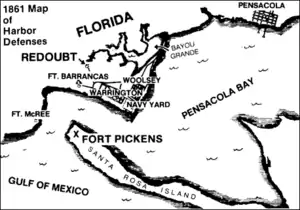Woolsey, Florida
Woolsey, Florida, was a small community located on the north side of the Pensacola Navy Yard,[1] the construction of which began in Northwest Florida in April 1826. The town was razed in 1922 to make way for expanded Navy facilities.

History
Creation
Recognizing the advantages of the Pensacola harbor and the large timber reserves nearby for shipbuilding, in 1825 President John Quincy Adams and Secretary of the Navy Samuel Southard made arrangements to build a Navy Yard on the southern tip of Escambia County, where the air station is today.[2] Navy captains William Bainbridge, Lewis Warrington, and James Biddle selected the site on Pensacola Bay. Commodore Warrington served as the first commandant of the navy yard. Warrington was succeeded by Commodore Melancthon Taylor Woolsey in late 1827, which position he held until 1831.[3]
"Commodore Woolsey created two villages, Warrington and Woolsey, outside the navy yard for homebuilding."[4][5]
Railroad
The Pensacola and Fort Barrancas Railroad , an eight-mile line connecting Pensacola with Fort Barrancas through Warrington, and Woolsey, was begun from 1870.[6] The company was incorporated by a special act of the State of Florida on February 12, 1870. It was granted an easement by Congress to run through the federal Navy Yard reservation on January 30, 1871.[7]
Elimination
Following The Great War, operation of land-based aircraft at Naval Air Station Pensacola increased. An expansion of the balloon operating field that opened immediately north of the old Navy Yard boundary in 1916 was undertaken in 1922. To make room for the enlarged facility, the small town of Woolsey was razed for the creation of the airdrome.[8] "Locals assumed the Army's involvement in the project and had to be informed that the field, initially called Station Field, was intended for the exclusive use of Navy landplanes."[9] The facility was renamed Chevalier Field in 1935.
No trace remains of Woolsey.
References
- U.S. Geological Survey Geographic Names Information System: Woolsey, Florida
- Shettle, Jr., M. L., "United States Naval Air Stations of World War II, Volume I: Eastern States", Schaertel Publishing Co., Bowersville, Georgia, 1995, Library of Congress card number 94-68879, ISBN 0-9643388-0-7, page 178.
- The National Cyclopaedia of American Biography, Being the History of the United States Vol. VIII, p. 99. James T White & Co, 1898 (digitized by Google 22 Jun 2007, from original held by New York Public Library)
- Johnson, Jane, "Santa Rosa Island - A History (Part 2)", page 3.
- http://www.navarrepass.com/graphics/SRI_history.pdf
- Turner, Gregg M., "A Journey Into Florida Railroad History", University Press of Florida, Library of Congress card number 2007050375, ISBN 978-0-8130-3233-7, page 94.
- Turner, Gregg M., "A Journey Into Florida Railroad History", University Press of Florida, Library of Congress card number 2007050375, ISBN 978-0-8130-3233-7.
- "Abandoned & Little-Known Airfields: Florida: Southwestern Pensacola". airfields-freeman.com. Retrieved 22 September 2015.
- Shettle, Jr., M. L., "United States Naval Air Stations of World War II, Volume I: Eastern States", Schaertel Publishing Co., Bowersville, Georgia, 1995, Library of Congress card number 94-68879, ISBN 0-9643388-0-7, page 177.